| Srl | Item |
| 1 |
ID:
102759
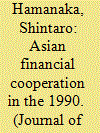

|
|
|
| 2 |
ID:
105313
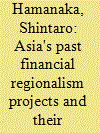

|
|
|
|
|
| Publication |
2011.
|
| Summary/Abstract |
This article analyzes five significant institutional variables related to membership and control of institutions, using comparative case studies of Asia's past regional financial projects from the 1950s through the 1990s. The five variables are: (i) countries included in or excluded from membership, (ii) membership tiers, (iii) institutional decision-making process, (iv) executive positions at organizational structure (e.g. secretariat and headquarters) of institutions, and (v) the location of the secretariat/headquarters. Past financial regionalism projects hold several important lessons for current initiatives. First, in the case of regional financial institutions, "inclusion in membership but exclusion from regional membership" is a possible option and it is crucial to go beyond the simple debate on the membership problem, namely inclusion and exclusion, when designing a regional financial institution. Second, no single country should dominate the decision-making process by voting power-an institution must maintain a delicate balance among its members in terms of voting. And finally, key to determining the success or failure of regional financial institutions is which country hosts the secretariat/headquarters and sends staff to the executive positions.
|
|
|
|
|
|
|
|
|
|
|
|
|
|
|
|
| 3 |
ID:
089515
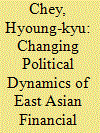

|
|
|
|
|
| Publication |
2009.
|
| Summary/Abstract |
This paper analyzes the factors that have contributed to the development of the Chiang Mai Initiative, one of the prominent examples of recent East Asian financial cooperation, by comparing it with the failed 1997 proposal for an Asian Monetary Fund
|
|
|
|
|
|
|
|
|
|
|
|
|
|
|
|
| 4 |
ID:
053664
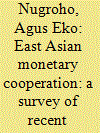

|
|
|
| 5 |
ID:
056064
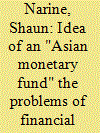

|
|
|
| 6 |
ID:
074826
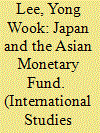

|
|
|
|
|
| Publication |
2006.
|
| Summary/Abstract |
Why did Japan propose the creation of the Asian Monetary Fund (AMF) that intentionally excluded the United States from membership in the middle of the Asian financial crisis? I argue that the immediate cause of Japan's AMF proposal lies in Japan's interest in defending the Asian model of economic development against the U.S.-led IMF bailout operation in Thailand. The exclusion of the United States was the key in realizing such an interest. Following an identity approach to international relations, I will demonstrate how Japan's Ministry of Finance (MOF) officials' conception of Japan and the United States as the two rivals promoting different models of economic development (i.e., Japan's state-led vs the U.S. market-based economic development) contributed to the making of Japan's AMF proposal. In doing so, I theoretically develop an identity-intention analytical framework designed to establish causation between an identity and a policy choice that emerge from a social, interactive structure. The framework offers a better way of dealing with the overdetermination of given interests as well as the underspecification of the kinds of interests at stake to which rational theorizing of international relations is often vulnerable.
|
|
|
|
|
|
|
|
|
|
|
|
|
|
|
|
| 7 |
ID:
067125
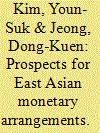

|
|
|